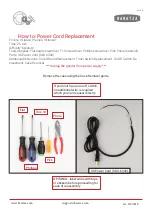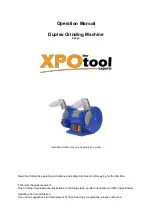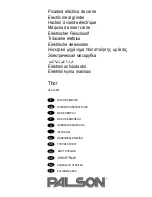
PDFW 120 A2
GB
│
IE
│
7
■
■
Replace damaged or heavily furrowed grinding
discs.
■
When transporting the bench grinder, lift it by
the housing or the two protective covers.
■
Adjust the tool rests so that the angle between
the tool rest and the accessory tool is always
greater than 85°.
Safety instructions for
all applications
General safety instructions for grinding, sand-
paper sanding, working with wire brushes,
polishing, milling and abrasive cutting
a)
This power tool is intended for use as a
grinder, sandpaper sander, wire brush,
polisher, milling machine and abrasive cutting
appliance. Please follow all safety instruc-
tions, instructions, diagrams and data that
you receive with the appliance.
If you do not
observe the following instructions, this can lead
to an electrical shock, fire and/or serious
injuries.
b)
Do not use any accessories that have not
been provided or recommended by the manu-
facturer for this power tool.
Just because you
can attach the accessories to your power tool,
does not guarantee they are safe to use.
c)
The permissible speed of the accessory tool
used must be at least as high as the maximum
speed specified for the power tool.
Accessories
that rotate faster than the permissible rate can
break and throw pieces into the air.
d)
The external diameter and thickness of the
accessory tool used must comply with the
dimensions of the power tool.
Incorrectly
dimensioned accessory tools cannot be suffi-
ciently shielded or controlled.
e)
Grinding discs, sanding drums or other
accessories must match the grinding spindle
or collet chuck of your power tool exactly.
Accessory tools which do not fit precisely into
the take-up of the power tool will rotate
unevenly, vibrate severely and can lead to a
loss of control.
f)
Discs, grinding cylinders, cutting tools or
other accessories mounted on a mandrel must
be completely inserted in the collet or chuck.
Any “protrusion” or exposed parts of the
mandrel between the grinding tool and the
collet or chuck must be kept to a minimum.
If the mandrel is not sufficiently tightened or the
grinding tool protrudes too far, the tool could
come loose and been thrown out at high speed.
g)
Never use damaged accessory tools. Before
each use, check accessory tools such as
grinding discs for chips or cracks, sanding
drums for cracks, wearing or excessive wear
and tear and wire brushes for loose or broken
wires. If the power tool or the accessory tool
in use is dropped, check to see if it is
damaged or use an undamaged accessory
tool. When you have checked and inserted
the accessory tool, ensure that you and any
other people in the vicinity remain outside of
the range of the rotating accessory tool and
allow the tool to rotate at maximum speed for
one minute.
Damaged accessory tools usually
break during this test period.
h)
Wear personal protective equipment.
Depending on the application, ensure that
you use full face protection, eye protection or
goggles. If required, use a dust mask, ear
protectors, protective gloves or special apron
to protect you from grindings and material
particles.
The eyes should be protected from
flying debris that may be caused during certain
applications. Dust or filter masks must be used
to filter any dust created by the application. If
you are exposed to loud noise for any length
of time, you may suffer hearing loss.
i)
Ensure that other people remain at a safe
distance to your workspace. Anyone who
enters the workspace must wear personal
protective equipment.
Fragments of the work-
piece or broken accessory tools can fly off
and cause injury – even outside the immediate
working area.
Summary of Contents for 353549 2010
Page 3: ...A...
Page 4: ...B F C D E...
Page 66: ...PDFW 120 A2 62 FR BE...
Page 144: ...PDFW 120 A2 140 SK...












































